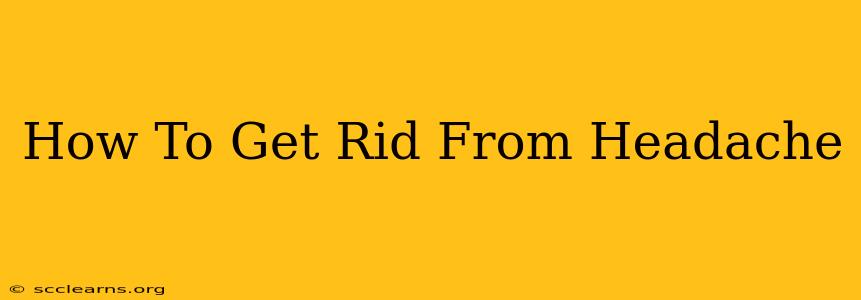A throbbing head can derail even the best-laid plans. Headaches are a common ailment, affecting millions worldwide. But understanding the types of headaches and employing the right strategies can significantly reduce their frequency and intensity. This guide explores various effective methods to banish that headache and get you back to feeling your best.
Understanding Your Headache: Types and Triggers
Before diving into remedies, identifying your headache type is crucial. Common types include:
- Tension Headaches: These are the most common, characterized by a tight band of pressure around your head. Stress, dehydration, and poor posture are frequent triggers.
- Migraines: More severe than tension headaches, migraines often involve throbbing pain, usually on one side of the head, accompanied by nausea, vomiting, and sensitivity to light and sound. Triggers can vary widely, from certain foods and drinks to hormonal changes and stress.
- Cluster Headaches: Intense, excruciating pain behind one eye, often accompanied by tearing and nasal congestion. These headaches occur in clusters, with multiple attacks over a period of time.
- Sinus Headaches: Pain concentrated in the sinuses (around the nose, cheeks, and forehead), often accompanied by nasal congestion and facial pressure. These are usually triggered by sinus infections or allergies.
Knowing your headache type helps pinpoint potential triggers and tailor your treatment approach. Keeping a headache diary can be invaluable in identifying patterns and predicting potential attacks. Note down the headache's location, intensity, duration, and any associated symptoms along with potential triggers like food, stress levels, or sleep patterns.
Quick Headache Relief Techniques: Home Remedies
For immediate relief, try these simple, effective methods:
1. Over-the-Counter Pain Relievers:
- Ibuprofen (Advil, Motrin): An effective NSAID for tension headaches and migraines.
- Acetaminophen (Tylenol): Useful for mild to moderate pain, including tension headaches.
- Aspirin: Another NSAID, but consult a doctor before use if you have a history of bleeding disorders or are on blood thinners.
Important Note: Always follow the recommended dosage on the label and consult a doctor or pharmacist if you have any concerns or pre-existing conditions.
2. Hydration is Key:
Dehydration is a common headache culprit. Drink plenty of water, especially if you've been sweating or haven't had enough fluids.
3. Rest and Relaxation:
Find a quiet, dark room and lie down. Try to relax your muscles and minimize external stimuli. A cool compress on your forehead can also help soothe the pain.
4. Apply Cold or Warm Compresses:
Experiment to see which works best for you. Some find cold compresses more soothing, while others prefer warmth.
5. Gentle Massage:
Gently massage your temples, forehead, and neck. This can help relieve tension and reduce pain.
6. Essential Oils:
Certain essential oils, like peppermint or lavender, may provide relief when applied topically (diluted in a carrier oil). Always do a patch test before applying to your whole head.
When to Seek Professional Medical Advice
While home remedies can provide relief for many headaches, it's essential to seek medical attention if:
- Your headaches are severe, frequent, or worsening.
- You experience sudden, severe headaches, especially with other symptoms like fever, stiff neck, vision changes, or numbness.
- Over-the-counter pain relievers don't provide relief.
- You have headaches accompanied by other concerning symptoms.
Ignoring persistent or severe headaches could be detrimental to your health. Early diagnosis and treatment are key for managing headaches effectively.
Preventing Future Headaches: Lifestyle Changes
Making proactive lifestyle changes can significantly reduce the frequency and severity of headaches:
- Manage Stress: Practice stress-reducing techniques like yoga, meditation, or deep breathing exercises.
- Maintain a Regular Sleep Schedule: Aim for 7-8 hours of quality sleep per night.
- Eat a Healthy Diet: Avoid skipping meals and limit processed foods, caffeine, and alcohol.
- Stay Hydrated: Drink plenty of water throughout the day.
- Exercise Regularly: Physical activity can help reduce stress and improve overall health.
- Identify and Avoid Triggers: Keep a headache diary to identify personal triggers and avoid them whenever possible.
By understanding your headache type, employing effective remedies, and making proactive lifestyle changes, you can significantly improve your quality of life and reduce the impact of headaches. Remember, if your headaches are severe or persistent, always consult a doctor for proper diagnosis and treatment.

